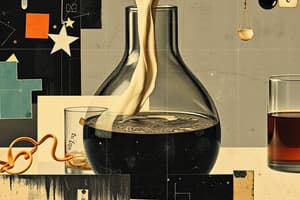Podcast
Questions and Answers
How does pressure and temperature contribute to the formation of petroleum?
How does pressure and temperature contribute to the formation of petroleum?
Pressure and temperature help convert the remains of dead plants and animals into liquid oil over time.
What defines a reversible change?
What defines a reversible change?
A reversible change is one that can be undone to return to the original substance, such as melting or boiling.
What is an example of an irreversible change?
What is an example of an irreversible change?
The burning of a candle wick is an example of an irreversible change.
What does it mean for two liquids to be immiscible?
What does it mean for two liquids to be immiscible?
Name one factor affecting the solubility of a substance.
Name one factor affecting the solubility of a substance.
What are good conductors of heat?
What are good conductors of heat?
How can expansion help in opening a stuck lid?
How can expansion help in opening a stuck lid?
What is electric conductivity?
What is electric conductivity?
What distinguishes miscible liquids from immiscible ones?
What distinguishes miscible liquids from immiscible ones?
What happens to solubility when stirring is increased?
What happens to solubility when stirring is increased?
How does pressure contribute to the formation of petroleum?
How does pressure contribute to the formation of petroleum?
Define reversible changes and provide one example.
Define reversible changes and provide one example.
What is an irreversible change? Give an example.
What is an irreversible change? Give an example.
Which substances listed are immiscible with water?
Which substances listed are immiscible with water?
What factors affect the solubility of a substance?
What factors affect the solubility of a substance?
Name one good conductor and one insulator.
Name one good conductor and one insulator.
Explain the term 'miscible' in relation to liquids.
Explain the term 'miscible' in relation to liquids.
What happens to solubility as temperature increases?
What happens to solubility as temperature increases?
How did Caren successfully open the jam bottle lid?
How did Caren successfully open the jam bottle lid?
What is the meaning of 'immiscible'?
What is the meaning of 'immiscible'?
Describe the process of how petroleum is formed from organic materials.
Describe the process of how petroleum is formed from organic materials.
What is the distinction between miscible and immiscible liquids?
What is the distinction between miscible and immiscible liquids?
How does temperature influence the solubility of a substance?
How does temperature influence the solubility of a substance?
Identify two factors that can affect the rate at which a solute dissolves in a solvent.
Identify two factors that can affect the rate at which a solute dissolves in a solvent.
Explain why sugar dissolves faster in hot water compared to cold water.
Explain why sugar dissolves faster in hot water compared to cold water.
What occurs during the thermal expansion of matter?
What occurs during the thermal expansion of matter?
Provide an example of a reversible change and explain why it is considered reversible.
Provide an example of a reversible change and explain why it is considered reversible.
What are conductors, and how do they differ from insulators?
What are conductors, and how do they differ from insulators?
In the context of mixtures, what happens when two liquids that are immiscible are combined?
In the context of mixtures, what happens when two liquids that are immiscible are combined?
Describe what is meant by irreversible changes and give an example.
Describe what is meant by irreversible changes and give an example.
What are the products obtained from petroleum?
What are the products obtained from petroleum?
Explain what 'solubility' means in the context of substances.
Explain what 'solubility' means in the context of substances.
List one factor that increases the solubility of a substance and explain how it affects solubility.
List one factor that increases the solubility of a substance and explain how it affects solubility.
Describe how thermal conductivity differs between conductors and insulators.
Describe how thermal conductivity differs between conductors and insulators.
What does the term 'miscible' indicate when describing two liquids?
What does the term 'miscible' indicate when describing two liquids?
Why was Caren able to open the jam jar's lid after running it under hot water?
Why was Caren able to open the jam jar's lid after running it under hot water?
What are the characteristics of substances that are considered conductors?
What are the characteristics of substances that are considered conductors?
Differentiate between small and large particles in the context of solubility.
Differentiate between small and large particles in the context of solubility.
What is the significance of irreversible changes in everyday life?
What is the significance of irreversible changes in everyday life?
Provide an example of a reversible change and explain why it is reversible.
Provide an example of a reversible change and explain why it is reversible.
Flashcards
Petroleum Formation
Petroleum Formation
The process where pressure from heat and weight of rocks transforms dead plants and animals into liquid oil.
Reversible Change
Reversible Change
Changes where the original substance can be regained by reversing the process.
Irreversible Change
Irreversible Change
Changes where the original substance cannot be regained.
Miscible Liquids
Miscible Liquids
Signup and view all the flashcards
Immiscible Liquids
Immiscible Liquids
Signup and view all the flashcards
Thermal Conductivity
Thermal Conductivity
Signup and view all the flashcards
Good Conductors of Heat
Good Conductors of Heat
Signup and view all the flashcards
Insulators
Insulators
Signup and view all the flashcards
Electrical Conductivity
Electrical Conductivity
Signup and view all the flashcards
Good Conductors of Electricity
Good Conductors of Electricity
Signup and view all the flashcards
What is evaporation?
What is evaporation?
Signup and view all the flashcards
What is melting?
What is melting?
Signup and view all the flashcards
What is condensation?
What is condensation?
Signup and view all the flashcards
What is freezing?
What is freezing?
Signup and view all the flashcards
What is a reversible change?
What is a reversible change?
Signup and view all the flashcards
What is an irreversible change?
What is an irreversible change?
Signup and view all the flashcards
What are miscible liquids?
What are miscible liquids?
Signup and view all the flashcards
What are immiscible liquids?
What are immiscible liquids?
Signup and view all the flashcards
What is thermal conductivity?
What is thermal conductivity?
Signup and view all the flashcards
What is electrical conductivity?
What is electrical conductivity?
Signup and view all the flashcards
How is petroleum formed?
How is petroleum formed?
Signup and view all the flashcards
What are good conductors of heat?
What are good conductors of heat?
Signup and view all the flashcards
What are insulators?
What are insulators?
Signup and view all the flashcards
What are good conductors of electricity?
What are good conductors of electricity?
Signup and view all the flashcards




